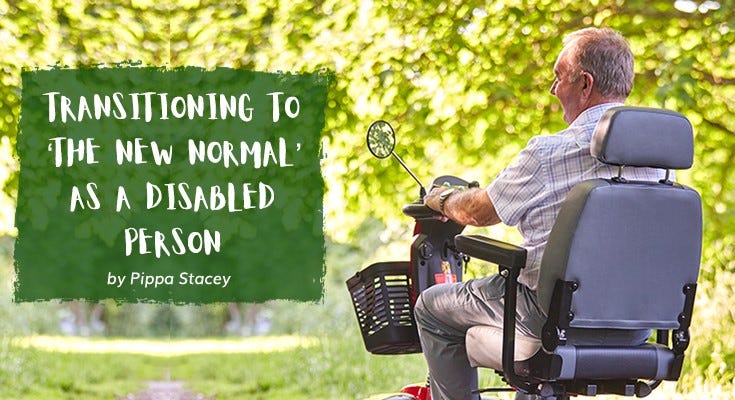The last three months have been a rather bizarre time for people in the UK. Day-to-day life radically changed almost overnight, and it isn’t surprising that the gradual easing of lockdown restrictions in recent weeks has evoked mixed opinions.
Many people, most notably the non-disabled population, are hyped for some semblance of ‘normality’ to return. There’s been widespread celebration of shops and tourist attractions re-opening, and of course, of the lenience allowing for a blessed pint at the pub.
That said, I’m still one of many non-disabled people who’ll be self-imposing continued social distancing and (to an extent) self-isolation, even as restrictions are officially relaxed and people begin to mingle more frequently. When you’re dealing with any kind of long-term condition, often you just cannot justify being complacent.
Even for those who aren’t shielding, we know that the implications of catching Covid-19 likely aren’t worth the risk of a trip down the pub… however much the cocktails are calling.
With that in mind, I recently took to Twitter to gauge how other disabled and chronically ill people were feeling at this moment in time, and to discover their own stance on how much or how little they would be continuing to self-distance and follow their own advice. Here’s what I found…
How likely would you be to attend a secluded, outdoor space?
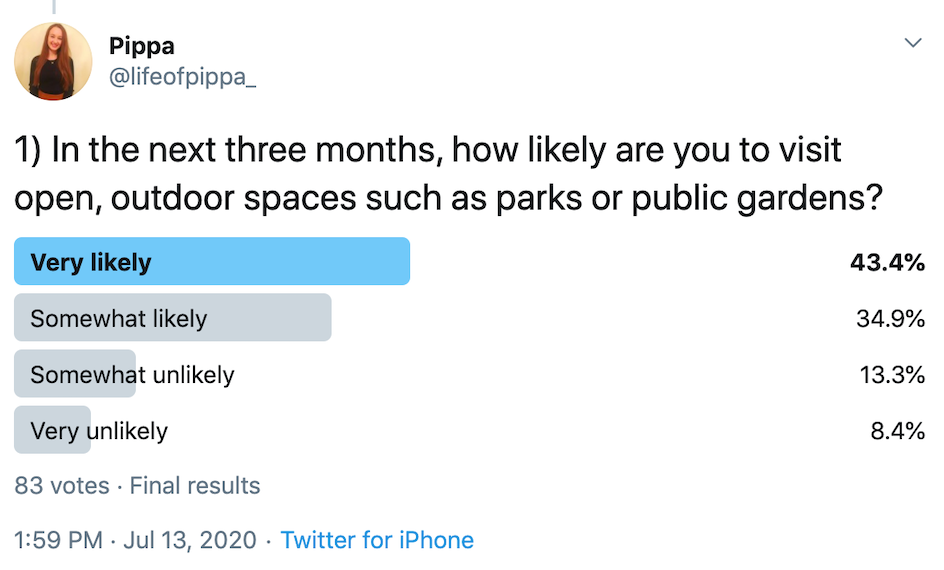
 When asked how likely they would be to visit open, outdoor spaces such as parks or public gardens in the next three months, just under half of respondents reported they would be very likely to do so.
When asked how likely they would be to visit open, outdoor spaces such as parks or public gardens in the next three months, just under half of respondents reported they would be very likely to do so.
This finding didn’t surprise me: vast green spaces in the outdoors seem to be the safest place for getting out of the house for some fresh air, and easily allow for social distancing.
My own (non-medical) first trip out after three months at home was to a quiet and secluded outdoor spot, where I was genuinely excited to see other human beings in the distance, but relieved to keep a good long way away from them.
Heather agrees, explaining that she’s “… happy to be out in parks but keeping my distance”, and that she feels okay with visiting friends in back yards. Only 8.4% of respondents were very unlikely to visit outdoor spaces, the smallest percentage throughout any of the options I considered… but a significant finding, which goes to show that many vulnerable people still won’t even be risking what’s thought to be the safest option for getting out and about.
How likely would you be visit shopping centres or retail parks?
 Specifically for recreational purposes rather than essential trips e.g. food shops, the responses to this question were directly reversed to those found for outdoor spaces: the majority would be very unlikely or somewhat unlikely to visit these establishments in the next three months.
Specifically for recreational purposes rather than essential trips e.g. food shops, the responses to this question were directly reversed to those found for outdoor spaces: the majority would be very unlikely or somewhat unlikely to visit these establishments in the next three months.
However, this area seems to be much more subjective, depending on the specific location and the social distancing measures in place, and the individual’s own thoughts and feelings.
As Katie explains, “I know I will/do feel much more comfortable in open/outdoor spaces rather than enclosed (i.e shopping centres etc). Saying that I will most likely judge it on the place / how much they have in place socially distance /handwashing/PPE etc wise & on how busy the place is... factors like that.”
Many of us with long-term conditions are well-practiced in conducting thorough background research into the places we intend to visit, and were doing so even before the pandemic hit, and I agree that judging these visits on a case-by-case basis seems to be the best course of action.
How likely are you to drink or dine in a pub or restaurant?
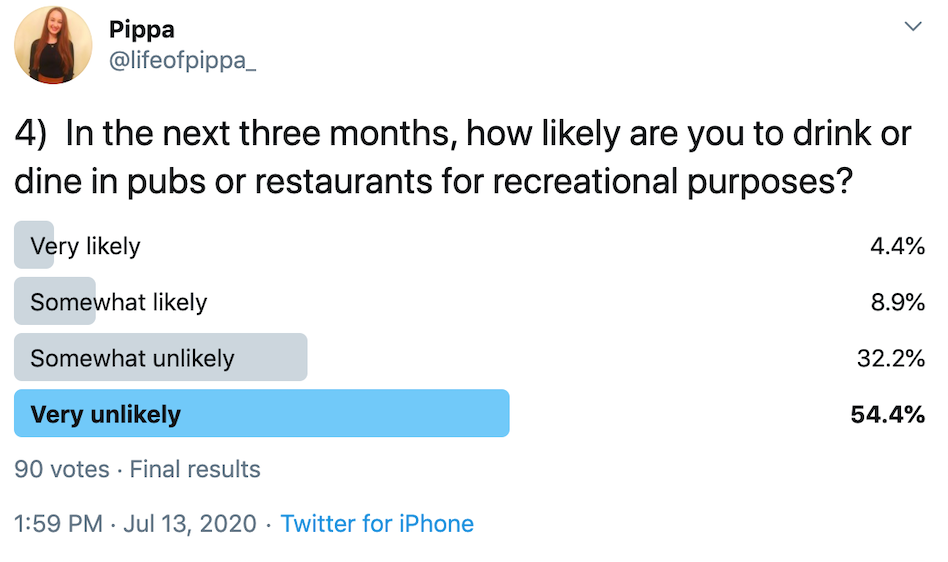 Although this one is without a doubt one of the most anticipated changes for non-disabled people, it doesn’t surprise me that 54% of respondents reported they were very unlikely to drink or dine in a pub or restaurant in the next three months.
Although this one is without a doubt one of the most anticipated changes for non-disabled people, it doesn’t surprise me that 54% of respondents reported they were very unlikely to drink or dine in a pub or restaurant in the next three months.
There seems to be an element of variability in this one, too.
Martha explains that she’s “going to plan outings really carefully and only go to places that I trust have done the work […]. I'll be avoiding city centre and anywhere too busy where possible.” In my opinion, this reflects an important point about the variability in the measures that businesses and enterprises are implementing to keep their customers safe.
Whilst the boss of Wetherspoons has made some questionable claims and actions throughout the pandemic, for example, many small businesses have gone above and beyond to do right by their visitors. And personally, there’s no doubt as to which of these I’d feel most comfortable dining with.
How likely are you to use public transport, such as buses and trains?
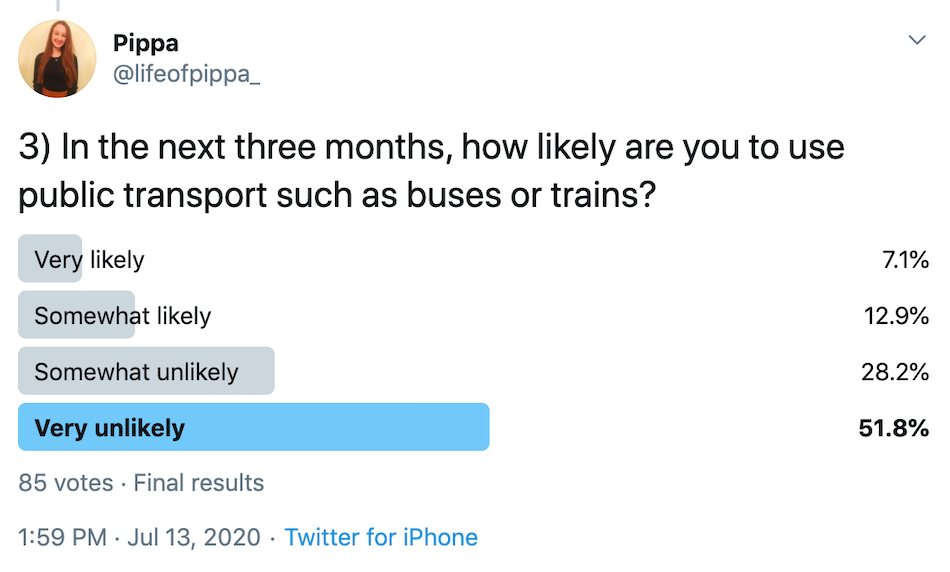 Finally, we have public transport; the question that sparked the most conversation. Even with new regulations requiring commuters to use face coverings on public transport, 51.8% of respondents were unlikely to catch a bus or train in the next three months. Only 7.1% indicated they would be very likely to do so, implying that the issue of public transport evoked the most hesitancy.
Finally, we have public transport; the question that sparked the most conversation. Even with new regulations requiring commuters to use face coverings on public transport, 51.8% of respondents were unlikely to catch a bus or train in the next three months. Only 7.1% indicated they would be very likely to do so, implying that the issue of public transport evoked the most hesitancy.
However, many of us know all too well that public transport plays an important role in independent living. We rely on buses and trains to travel for work, leisure and socialising, and I’m sure I won’t be the only one who’s felt the recent lack of this particularly profoundly.
Never would I have thought I’d be missing being stuck in the juddering doors of a Northern train because assistance forgot to find the ramp to get me off, and yet here we are.
As Ruth says, “…it’s harder to postpone, or avoid, riskier situations. My independence depends on public transport and when to start using it is a real dilemma. Access is deteriorating.”
As such, I believe many people will be keeping a close eye on reports of public transport in particular over the coming weeks. As for those who have no choice but to use it, I’m sure they know that being vigilant and taking precautions is key.
So, whilst our findings show variability in disabled and chronically ill people’s attitudes towards particular activities over the next few months, I think we can all agree that the best thing we can do is have empathy towards individuals and their decisions.
People’s circumstances vary, particularly in the disability and chronic illness community. We all have the right to make informed choices based on our own situations, and it follows that we should respect the decisions of others too.
If you're beginning to venture out into the world again and struggling on your feet, you can find CareCo's range of Walking Aids on this page
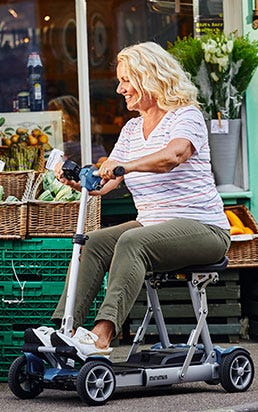

 Price Match Promise
Price Match Promise
 Next day delivery, 7 days a week
Next day delivery, 7 days a week
 Nationwide Showrooms
Nationwide Showrooms
 Rated Excellent
Rated Excellent
